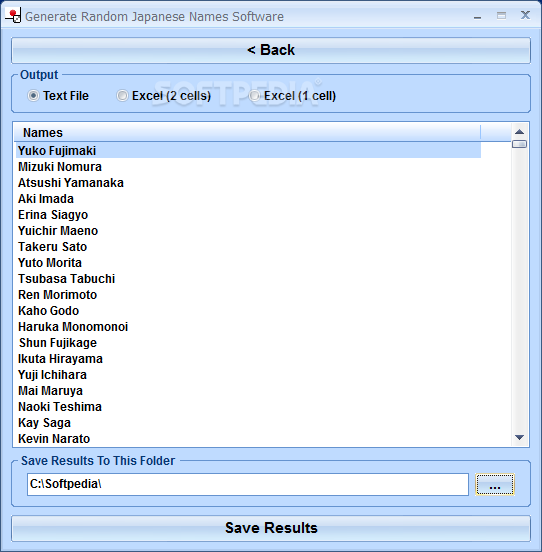
It is actually possible to use this phrase in three different ways, depending on the level of formality. The last part is our name followed by です (desu) representing “is” in English.Īnother way to introduce yourself is by saying the Japanese equivalent to “I am calling…” In spite of the fact that this is an upsetting phrase to some English speakers, this is the way Japanese people introduce themselves. When we use the word “name” (namae) in conjunction with the は (wa) prefix to identify the topic of discussion, the prefix becomes a verbal marker. A Japanese word for “I” is combined with the particle の (no) to create the word “my”.īecause it’s a polite word you can use in almost all situations, we’ll use わたしの (watashi no) for “my”. Japanese has a couple of words to describe your name.
#Japanese name generator how to#
When you learn Japanese, you can connect with over a hundred million new people! To learn how to introduce yourself, we will cover today how to say ‘my name is’ in Japanese. One of the best things about learning a new language is meeting new people. How many ways are there to say my name is in Japanese?
#Japanese name generator generator#
Japanese Name Generator (Make your name in Japanese)īelow we have provided links to some katakana name generators you can use to learn how to write your name in Japanese: The word can be pronounced in several different ways. When Japanese is written, there are three syllables. To continue our example with the English single-syllable word “James”, let’s revisit the previous example. Vowels should be stretched when necessary. Find out what katakana sound looks similar to the first syllable of your name once you’re done. There are usually between one and four syllables. Putting your name in syllables is a good start. Look for the Katakana character for J, which is ジャ, then ack, which is ック, Jack (Ja kku) ジャック Because you aren’t Japanese, they would write your name in katakana.įinding the Katakana letter that corresponds to your name’s pronunciation is the easiest method of writing your name in Japanese. You’ll also find that most Japanese people are familiar with how to write your name in katakana if you have a fairly common name. The benefit of writing foreign names with katakana is that a Japanese person can easily read and pronounce it, and just by looking at the name, they will know that it’s a foreign name. Everytimes I write an email I use Kanji instead of Katakana when writing my name. Kanji 栗定 栗 = くり 定 = さだ the sound same as Katakana クリサダ. We use katakana to write クリサダ.īut When I was a Junior at my former company. How to Write Your Name in Japanese (Katakana) It is unlikely that you will come across such a problem as a Japanese learner, so just take it as extra information.

Politeness is an essential element of this expression, a standard level in Japanese offices. Would you allow me to know what your name is? (onamae wo okikase itadakemasu deshouka?) This is commonly used when a person is calling to someone’s house. making a phone call), you may also have additional phrases.ĭonata sama desu ka? / dochira sama desuka? When you are at home or at the office (e.g.

If you’re asking the listener directly for their name, you can use any of the above phrases.

It can mean telling under some circumstances, though. There is a basic word in oshiete that means to teach: oshieru. It is not practical for asking someone’s name since the Japanese avoid saying Anata (YOU) (so, they are not used to asking for someone’s name in this way) since it is the standard form taught in Japanese textbooks. Let’s take a look at some common phrases.

It is usually Japanese people who avoid addressing the listener as YOU, so I’ll provide some common phrases. There is a simple template that everyone can follow so that the next story can continue. Let’s practice introducing ourselves in Japanese today. Hello everyone, today is our first meeting we should introduce ourselves to begin with, right? We often have an introduction to get to know each other in many situations.


 0 kommentar(er)
0 kommentar(er)
